If you’ve ever felt anxious, you’re not alone.
Anxiety is your body’s natural response to stress. It’s a feeling of fear or apprehension about the unknown. Perhaps a job interview, giving a speech or going on a first date may cause individuals to feel fearful and nervous.
But if your feelings of anxiety are extreme, or and are interfering with your life then, you may have an anxiety disorder.
What Causes Anxiety?
It’s important to note that anxiety disorders are not the result of personal weakness. For some, it is a strength that you onboarded early in life to protect yourself and others from drama and more trauma.
From scientific research, we know that anxiety is caused by a combination of factors, including brain chemistry and environmental factors.
Life challenges and different circumstances can often cause anxiety to drive our emotions. It can get so intense that the feeling of powerlessness can be destabilizing.
What’s more, if anxiety is not treated, it can lead to deep feelings of depression and other challenging health problems. And, when anxiety is treated, some find underneath the anxiety may be a mound of depression. The anxiety can act as a gatekeeper to keep you from feeling depressed. So, often the two go hand in hand.
How Anxiety Affects Relationships
Most individuals who experience anxiety often feel relationally challenged with people and situations. People who experience intense anxiety, struggle to live their everyday life healthily.
Unfortunately, anxiety can lead to a pattern of attracting addictive relationships, which can result in love addiction and even serious codependency issues.
Do I Have Anxiety? Here Are Some Common Signs
If you’re wondering if you or a loved one has an anxiety disorder, here are the most common anxiety symptoms:
Most Common Signs Of Anxiety Disorder:
- Racing thoughts
- Rapid breathing and shortness of breath – leading to not enough oxygen
- Difficulty falling asleep or interrupted sleeping patterns and insomnia
- A fear that something terrible is going to happen to yourself or your loved ones
- Stomach problems – indigestion, constipation, and diarrhea
- Restlessness and feeling unable to relax – feeling tense most of the time
- Constant “thinking” resulting in fatigue
- Difficulty handling uncertainty or indecisiveness
- The inability to let go of worry
- Feeling fearful all the time
- Increased heart rate
- Trouble concentrating
- Nightmares
- Panic attacks
Anxiety And Depression
If you have an anxiety disorder, you may also be feeling depressed. Although anxiety and depression can occur separately, it’s common for both to occur together.
Anxiety can be caused by clinical depression. Likewise, severe depression can be triggered by an anxiety disorder.
The good news… symptoms of both conditions can be managed with the same treatments: professional counseling, medication, and lifestyle changes.
What To Do If You Experience Anxiety Disorder?
If you think you are in experiencing an anxiety disorder, the first step is to get diagnosed.
You will need to be patient, as an anxiety diagnosis includes a lengthy process of physical examinations, mental health evaluations, and psychological questionnaires.
How To Deal With Anxiety
Once you’ve been diagnosed, you can explore treatment options. For some individuals, lifestyle changes may be enough to cope with the symptoms.
In moderate or severe cases, however, counseling or medical treatment can help to overcome the symptoms and help you lead a healthy life.
The good news is you’re not stuck with this forever. You can learn how to calm anxiety and create a healthy relationship in the future.
Recovery starts with being aware of and recognizing the symptoms. It is about healing yourself and being committed to healing.
Let PIVOT Advocates Help!
We recommend that you seek support from professionals. Remember, you are worthy of happiness, love and a healthy relationship.
The Glass House offers intensive relationship building skills workshops designed to repair and restore relational challenges as well as calm down the nervous system and begin to tolerate feelings that occur. This is a BIG help to reduce anxiety brought on by relationship challenges.
What’s more, you can work with the PIVOT Advocates whenever it suits you. Our coaches can help you with your relationship conflicts, enable you to express your desires and emotions in a healthy way, practice vulnerability in relationships, and assist you in achieving a greater understanding of yourself.
Whether you choose our couples or individual coaching programs, you can expect swift progress towards healthier and happier relationships. We’re here to help.

